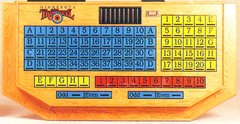In the 2012 session of the Minnesota legislature, language was added "a paddle wheel may be an electronic device that simulated a paddle wheel." The problem now rests with the tickets. Paddle tickets, attached to paddle ticket cards, are quite expensive on a per-bet basis. The paddle ticket language was designed before personal computers were in popular use (1985 -1986). Each ticket is serial numbered and they are sold as a group of five attached to a single serial numbered stub.
For the 2013 legislative session, the membership of Allied Charities of Minnesota, the charitable gaming trade association, voted to have corrective language submitted to the legislature allowing for electro-mechanically printed tickets, similar to those printed for lottery or Keno. Thus, the bills H.F. No. 1060 and S.F. No. 1006 were drafted and introduced as the charitable gaming bills with language that would correct the ticket associated problems allowing efficient introduction of electronic paddle wheels.
Shortly after the bills were introduced, several lobbyists for the tribes suggested to the leadership of Allied Charities of Minnesota that they had a problem with the paddle ticket language in the charitable gaming bills. The leadership of ACM consented to have the paddle wheel language struck in order to preserve their alliance with the tribes in good standing. Thus, in the Senate State and Local Government Committee, the paddle ticket language was struck on a voice vote. It is not me so much as it was the charities who have been injured. The charities, especially the rural charities in bars too small to warrant wheels with tables, would have made money not only from the operation of the authorized electronic wheels, but from the efficient use of computer technology in reducing their use of paper tickets by at least 95%. The charities would have had an excellent control system and the regulatory agency would have had a perfect fix on every dollar moved on the games. The environment would have been helped by the use of far fewer tickets along with the freight for those tickets. Obviously, the tribes were nervous over the possible competition the Parlor edition of the Tri-Wheel would have brought their casinos. We might say, in a backhanded way, they have endorsed the potential of the game.
There is still a chance given the language remains in the House version of the bill. I would suggest Minnesota charities that care about the possibility of operating the Parlor edition, call Al Lund at Allied Charities of Minnesota 651-224-4533 and call Representative Joe Atkins (651) 296-4192 - pretty much the key legislator for gaming on the House side. Let Rep Atkins know that you want the paddle wheel ticket language in H.F. No. 1060 to remain in the bill.
Mar 16, 2013
Subscribe to:
Post Comments (Atom)



3 comments:
Thanks in favor of sharing such a pleasant thinking, article is nice, thats why i have read it entirely
Look at my site :: bd facebook - web Design solution provided by different Tech
Post a Comment